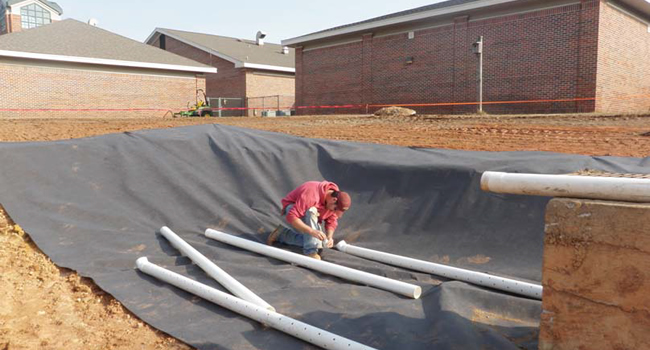Erosion and sediment control advances have produced enormously beneficial results, in infrastructure performance and economics; yet, rates of erosion and sediment control system adoption rates have lagged behind the research supporting them. Dr. Eve Brantley, an extension specialist and associate professor with Auburn University’s Crop, Soil, and Environmental Sciences Department in the renowned College of Agriculture, has looked at the lag in adoption and how to create effective education to improve this situation.
Listen to “Creating Effective Education Programs for Erosion and Sediment Control” on Spreaker.

For this episode of the GeoTalk Podcast, Geosynthetica’s editor Chris Kelsey sat down with Dr. Brantley during the International Erosion Control Association Conference and Exhibition to learn more about overcoming challenges to low impact development.
GeoTalk is published on Tuesdays. Previous episodes:
- June 6: Craig Benson on Sedimentation, Dams, and Watershed Health
- June 13: Robert Bowers on Geosynthetics in Segmental Concrete Pavements
- June 20: The Geotechnical Poetry of Mary Nodine
- June 27: Leap Frog Ideas for Low Impact Development
Subscribe on iTunes and in the Google Play store.
EFFECTIVE EDUCATION AND EROSION/SEDIMENT CONTROL SYSTEM ADOPTION
“You can have education that touches no one!” Dr. Brantley says. “Effective education programs have several common elements. One of the most important ones: What is your message? Then you really need to understand who your audience is. … Water touches everyone.”

Dr. Brantley was one of four contributing authors to “Low Impact Development Handbook for the State of Alabama.” The publication is available for free download at:
https://itunes.apple.com/us/book/planning-for-stormwater/id1111720393?mt=11
“This is more about quality of life,” she says. “It’s not necessarily a priority until it’s a problem.”
She talks about how each unique stakeholder—regulators, stormwater managers, watershed groups, etc.—has to be approached slightly differently.
“We may all have the same goal: clean water,” she says. “But, tailoring our message so that we reach those folks through workshops, meaning hands-on technology transfer, innovative websites, one on one contact … [enables us to] build that energy and enthusiasm so that we can continue to put good projects on the ground and share the why we are doing them along with the how.”

This is a strong way to approach effective education, not just in university programs but in the active field.
Listen to Dr. Eve Brantley’s comments in the GeoTalk Podcast.
RESOURCES
The Alabama Cooperative Extension System (ACES) operates as the primary outreach organization for the land-grant functions of Alabama A&M and Auburn Universities. Learn about its Low Impact Development expertise at www.aces.edu/lid.
See also: Auburn’s stormwater research information at http://agriculture.auburn.edu/stormwater/.
See also: Auburn’s iBook on green infrastructure and low impact development, “Planning for Stormwater.”











